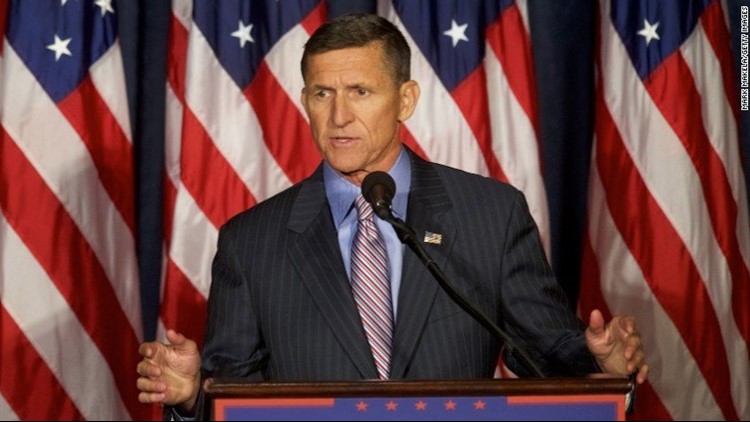WASHINGTON– The Trump administration is getting tough with Iran — but can’t yet say how it will back up its rhetoric.
National Security Adviser Michael Flynn made a surprise, first-on-camera appearance Wednesday, using the authority of the White House briefing room to send a strong message to the leaders of the Islamic Republic and the wider Middle East.
“As of today, we are officially putting Iran on notice,” Flynn said, in a statement condemning a recent Iranian ballistic missile launch and attacks on Saudi and Emirati vessels by Yemeni-based Houthi rebels, which are backed by Iran.
Flynn also spoke of threats to the US and allied shipping in the Red Sea, in remarks that left little doubt that an era of dialogue between the Obama administration and Iran, which thawed more than 30 years of boiling antagonism and proxy warfare, is now over.
Flynn intended to make clear that the new management in the White House would not tolerate what it sees as Iran’s destabilizing activity throughout the wider Middle East, following Republican claims that the last White House did just that to shield its legacy-enhancing nuclear deal.
“The Obama administration failed to respond adequately to Tehran’s malignant actions, including weapons transfers, support for terrorism, and other violations of international norms,” said Flynn. “The Trump administration condemns such actions by Iran that undermine security, prosperity, and stability throughout and beyond the Middle East and place American lives at risk.”
Tony Blinken, the former deputy secretary of state in the Obama administration, said that Iranian missile tests were a serious issue and that a mechanism existed at the UN to address any infringements.
Blinken, now a CNN contributor, added: “I am not sure what putting Iran ‘on notice’ means.”
Flynn argued that the test-firing of the missile on Sunday was a breach of a UN Security Council resolution. Iran denied that the launch infringed the resolution, which bars the testing of nuclear-capable missiles.
White House officials were careful to say that the new, rugged US approach to Iran stood apart from the international deal to put a lid on the Iran’s nuclear program.
But the statement was a clear sign that the new White House intends to make a sharp change of course from the Obama years and is willing to be more proactive in confronting Iran’s projection of power that it believes threatens its Middle East allies.
The day’s events were also a study in the pitfalls of a new administration enacting its stated determination to strike a tougher, more steely posture on the world stage, before it has formulated its policy options and is able to say what steps it will take to enforce its warnings.
Several hours after Flynn spoke, three administration officials, speaking on condition of anonymity to discuss White House policy, conducted a briefing for reporters but offered little to illuminate Flynn’s warning.
“There are a large number of options available to the administration, we are going to take appropriate action. And I will not provide any further information today relative to the question,” one of the senior officials said.
Pressed by reporters on whether he envisaged military, economic or other action, the official declined to elaborate.
“We are considering a whole range of options, we are in a deliberative process,” the official said. “The important thing here is we are communicating that Iranian behavior needs to be rethought by Tehran, that we consider these actions to be inherently destabilizing and a treat to our friends and allies.”
The official said that the new administration was considering such behavior in a “different perspective” than the previous administration, while a second official warned that the Trump team would not be “shy” in responding to Iran on issues of state-sponsored terrorism for instance.
But after Flynn’s warning and Trump’s promise in his campaign that his tough leadership style will win new respect from US enemies, the lack of specifics could risk leaving Tehran with the impression that the administration is not yet ready to respond to any escalation.
For now, the White House seems to be hoping that words will be enough.
“It is our sincere hope that Iran will heed this notice today and will change their behavior,” the first official said.
Wednesday’s word of warning from Flynn were his first chance to flex his authority since he was selected to the post by Trump.
The former general had to endure intense criticism after he was named, and warnings by former colleagues that he lacked the temperament, experience and knowledge for the role.
But Sen. Bob Corker, the Republican Chairman of the Senate Foreign Relations Committee who met with Flynn Wednesday, backed the new tone coming out of the White House.
“I am very encouraged by the seriousness with which President Trump is approaching the full range of threats Iran poses to American interests,” Corker said in a statement. “It is clear that Iran will no longer be given a pass and will be held accountable for its illicit behavior.”



